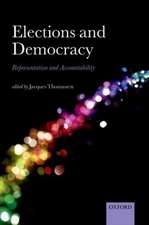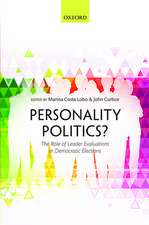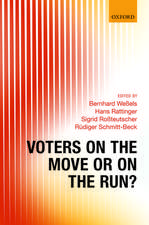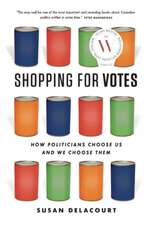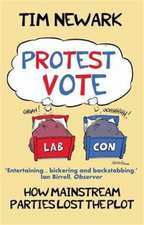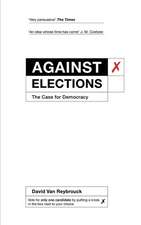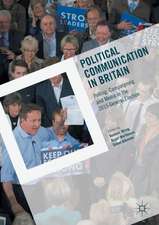Social Structure and Voting in the United States
Autor Robert B. Smithen Limba Engleză Hardback – 18 mar 2016
| Toate formatele și edițiile | Preț | Express |
|---|---|---|
| Paperback (1) | 647.08 lei 6-8 săpt. | |
| SPRINGER NETHERLANDS – 25 apr 2018 | 647.08 lei 6-8 săpt. | |
| Hardback (1) | 653.33 lei 6-8 săpt. | |
| SPRINGER NETHERLANDS – 18 mar 2016 | 653.33 lei 6-8 săpt. |
Preț: 653.33 lei
Preț vechi: 768.62 lei
-15% Nou
Puncte Express: 980
Preț estimativ în valută:
125.01€ • 131.22$ • 103.76£
125.01€ • 131.22$ • 103.76£
Carte tipărită la comandă
Livrare economică 10-24 aprilie
Preluare comenzi: 021 569.72.76
Specificații
ISBN-13: 9789401774857
ISBN-10: 9401774854
Pagini: 381
Ilustrații: XXX, 399 p. 57 illus. in color.
Dimensiuni: 155 x 235 x 24 mm
Greutate: 0.78 kg
Ediția:1st ed. 2016
Editura: SPRINGER NETHERLANDS
Colecția Springer
Locul publicării:Dordrecht, Netherlands
ISBN-10: 9401774854
Pagini: 381
Ilustrații: XXX, 399 p. 57 illus. in color.
Dimensiuni: 155 x 235 x 24 mm
Greutate: 0.78 kg
Ediția:1st ed. 2016
Editura: SPRINGER NETHERLANDS
Colecția Springer
Locul publicării:Dordrecht, Netherlands
Public țintă
ResearchCuprins
Introduction.- Voters for Obama.- Variables of Practical Voting.- Models of Practical Voting.- Post-Industrial Indicators, Human Development, and Red-Purple-Blue States.- Gauging Income Inequality.- Validity of a Typology of States.- Consequences of Four Types of States.- Gauging Moral Conservatism.- Determinants of Social Conservatism.- Determinants of a State's Political Color.- Moral Conservatism and Voting.- Moral Conservatism, Distractors, and Authoritarianism.- Evidence-Based Insights.
Notă biografică
Robert B. Smith (Ph.D. Columbia University, 1971) taught political sociology, research methods, and theory development at the University of California, Santa Barbara. His research there focused on war, public opinion, and dissent; generalizations of path analysis; and theoretical modeling. Subsequently, he has worked extensively in applied research. His publications include articles on political and social processes, and on multilevel models bearing on human development. He is the primary editor of the three volumes of the A Handbook of Social Science Methods, which link qualitative and quantitative methods. He is the author of Cumulative Social Inquiry: Transforming Novelty into Innovation (2008) and Multilevel Modeling of Social Problems: A Causal Perspective (2011). Smith was a Fulbright lecturer in structural sociology at Ghent University, Belgium, and he has served as president of the Boston Chapter of the American Statistical Association. His email address is rsmithphd@comcast.net
Textul de pe ultima copertă
This bookanalyzes practical and moral influences on voting decisions. Undermining the widespreadassumption that economic self-interest is the key determinant of voting choices,it discovers that moral considerations rooted in religious traditions are oftenthe more decisive. This finding is confirmed through a close analysis oftangible problems, such as child neglect and crime, problems which one wouldexpect to trouble practical voters. Further, this book suggests that politicalideologies influence party affiliation, rather than the other way around. It definesfour categories of states in terms of human development and income equality—South,Heartland, postindustrial, and “balanced.” It then explains why politicalcolor (red, purple, or blue) and societal problems vary across thesecategories. Voters’ moral ideologies, itshows, combine with a state’s measure of income equality and human development toshape a state’s readiness to pursue practical solutions to societal problems. Finally, it shows that moral ideologiesof the religious right and authoritarianism, two very different concepts, are in fact intertwined empirically. This book thus suggests that education—a keydriver of human development, anti-authoritarianism, and deliberative voting—shouldbegin in preschools that are both nurturant and instructive.
Caracteristici
Sheds light on the changing role of political ideology in an increasingly complex American society Provides valuable insights into which variables are crucial and how they have changed Clarifies notions of party alignments, liberalism and conservatism, independent voting, and the radical right Examines the intertwining of religious doctrine and sentiments about the possession and use of guns Offers suggestions that may amelioratedysfunctional consequences Includes supplementary material: sn.pub/extras

